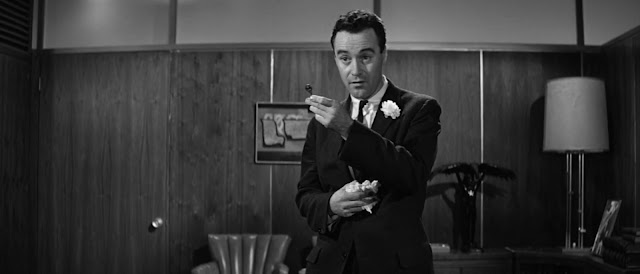 |
| C. C. Baxter (Jack Lemmon) offers up the key to his apartment. |
Release Date: June 15, 1960. Running Time: 125 minutes. Screenplay: Billy Wilder, I. A. L. Diamond. Producer: Billy Wilder. Director: Billy Wilder.
THE PLOT:
C.C. Baxter (Jack Lemmon) works in the Ordinary Policy Department of Consolidated Life, a New York insurance company. He has ambitions, a plan to move up the ladder by exploiting his most valued possession: His apartment.
Baxter is allowing four managers to use his place for assignations, in exchange for them putting in a good word with personnel director Jeff Sheldrake (Fred MacMurray). But when he finally gets his meeting with this supposedly moral family man, he learns the cost of his coveted promotion: to make a copy of his apartment key to share with Sheldrake.
This is no great matter to Baxter... until he discovers that Sheldrake's mistress is pretty young elevator operator Fran Kubelik (Shirley MacLaine), the object of Baxter's own affections. Sheldrake is stringing Fran along in the cruelest way possible, making her feel small with one sentence and promising to leave his wife for her in the next - and it soon enough falls to Baxter to try to fix the human wreckage his boss has left behind!
 |
| Cleaning up his boss's mess: Baxter tends to Fran (Shirley MacLaine). |
JACK LEMMON AS C. C. "BUD" BAXTER:
The Apartment balances comedy and drama, with both elements often running simultaneously. As such, the film makes full use of star Jack Lemmon's ability to remain fully earnest even while doing physical comedy.
Baxter, suffering from a bad cold, juggles his "appointments" so that he can go home. Lemmon flips through his rolodex while spraying cold medicine in his nose while juggling the phone. When he finally gets his meeting with Sheldrake, he all but struts to the office... only to become a picture of nervousness when The Big Boss hones in on the arrangement he's made with his supervisors. There's a split second in which he squeezes his nasal medicine and a jet of it sprays across the office. Lemmon performs all the bits of physical business perfectly. This extends to entirely serious scenes. When Baxter discovers that Fran is Sheldrake's mistress, his change in expression is small, the drop in his voice tiny - but both fluctuations are extremely effective.
Most of all, he projects an everyman quality that keeps the viewer on his side. Imagine if, instead of pairing a second time with Lemmon, director Billy Wilder had cast his Some Like It Hot co-star, Tony Curtis. The film would still work, but it would be an instantly more cynical picture. With Lemmon, we never doubt that Baxter is a decent person despite the sleaziness of his arrangement, and that in itself is enough to keep a certain lightness in the story even when it takes its darkest turns.
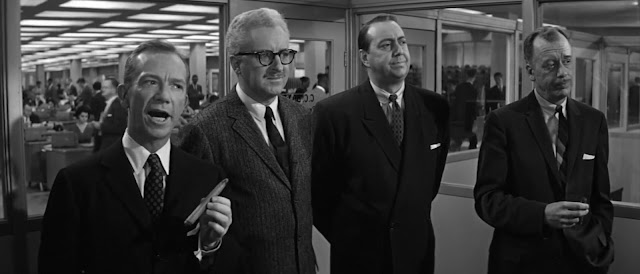 |
| The four "rotten apples": The middle managers pressure Baxter to keep up their deal. |
OTHER CHARACTERS:
Fran: "For a while there, you try kidding yourself that you're going with an unmarried man. Then one day, he keeps looking at his watch and asks you if there's any lipstick showing... and it all begins to look so ugly." The script uses its first big scene between Fran and Sheldrake to make clear that she initially believed he was single. It's a great monologue, which MacLaine delivers well. For my money, though, her best acting comes when she and Sheldake exchange Christmas gifts. She gives Sheldrake a genuinely thoughtful present. He responds by saying, "We better keep it here" (at the apartment). Then comes his "gift": $100 bill dropped discreetly into her purse. The camera pushes in very slightly as Fran registers the money and its meaning - as it once again "all begins to looks so ugly."
"The Rotten Apples": The four middle managers who created the initial arrangement with Baxter: Dobisch (Ray Walston), Kirkeby (David Lewis), Wanderhoff (Willard Waterman), and Eichelberger (David White). The early part of the film makes clear how badly they are abusing the deal with Baxter, who is pushed out of his place at midnight so that Dobisch can bring back a blonde he's just met who reminds him of Marilyn Monroe. After Baxter moves up, their use of the apartment stops. One scene shows all four attempting to intimidate Baxter, only for Sheldrake to walk in. The four are oblivious to Sheldrake's use of the apartment, but they still instantly change their behavior because... well, he's their boss.
Dr. Dreyfuss: Baxter's next-door neighbor, well played by Jack Kruschen. In his first scenes, he seems mostly amused by the life he assumes Baxter is living. Then Fran, in a particularly desperate moment, makes an attempt on her own life using sleeping pills. Baxter rushes to Dreyfuss. The doctor helps her, and he even agrees to remain discreet. But his previous amusement with Baxter vanishes as he warns that most people who attempt suicide try again. He is entirely serious in his disgust when he tells Baxter to "be a mensch... a human being!"
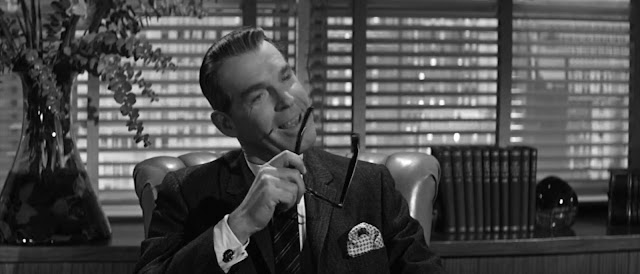 |
| Jeff Sheldrake (Fred MacMurray): Not the morally upright family man he pretends to be. |
FRED MACMURRAY AS MR. SHELDRAKE:
Sheldrake is the person in the film least likely to be considered a "mensch." He is introduced lecturing Baxter about how "four rotten apples" could ruin public trust in the company - only to immediately manipulate Baxter into handing over his apartment key. If he had gone into politics, he'd probably be espousing "family values" at this moment. This is another wonderfully written scene. Sheldrake never actually asks Baxter for his key. Instead, he makes several individually innocuous statements to steer his subordinate into offering it.
Sheldrake rekindles the relationship with Fran by promising to divorce his wife. It's a classic lie that she believes because she wants to - but Sheldrake is a man with no shame, and a few scenes later he complains to Baxter: "You see a girl a couple of times a week, just for laughs, and right away she thinks you're going to divorce your wife." Well, of course she does - You told her you were going to!
The Apartment was the last of Fred MacMurray's surface-respectable cads. By this point, he had already turned to family friendly fare, such as the previous year's The Shaggy Dog. He experienced some backlash when this came out and reportedly vowed to never play such a role again. A pity - I always thought he was at his best in this type of role, rather than the more Disney-fied fare that made up most of the last two decades of his career.
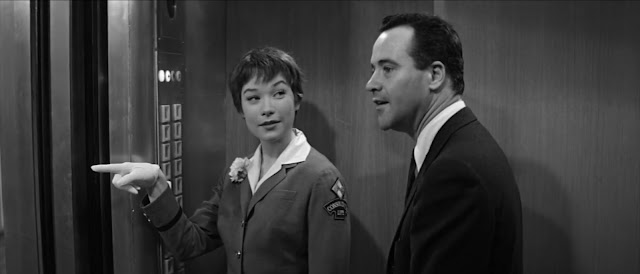 |
| Baxter clumsily attempts to flirt with Fran. |
THOUGHTS:
"That's the way it crumbles, cookie-wise."
-musings from both Baxter and Fran at different points in the story.
Director/co-writer Billy Wilder followed up his Hays Code-puncturing hit, Some Like It Hot, with another movie that was considered shocking at the time: The Apartment, a comedy/drama with a plot revolving around serial adultery.
Decades on, the content is no longer shocking. And divorced of that... The Apartment still holds up as a sharp, smart, wonderfully scripted and acted movie. The script, by Wilder and frequent collaborator I. A. L. Diamond, is impeccable in balancing potentially clashing tones, and Wilder uses a mix of comedic and dramatic cinematic language to strong effect throughout the first half.
The first half hour is entirely comedic in tone. It's not just that many of the lines and visual bits are funny. Everything about the presentation clues us in that this is a comedy. Dialogue is a rapid patter, emphasizing one-liners and exaggerated reactions. A comedic set piece is made of Baxter's desperate attempt to clear the night's schedule so that he can lie in with a cold, with repeated phrases ("I'll get back to you") and rapid cuts between Baxter at his desk and the managers in their offices.
Then Fran meets Sheldrake, and the tone shifts. Line deliveries become slower, as does the film editing. This, the emotional dialogue, and the performances of Shirley MacLaine and Fred MacMurray all tell us that we are now watching a drama.
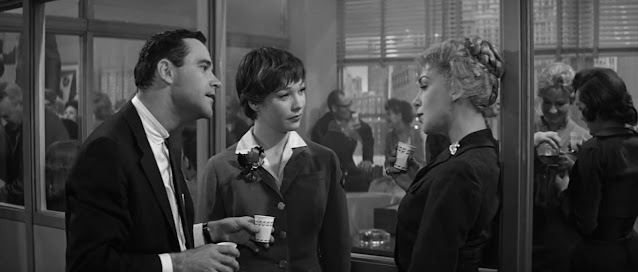 |
| Baxter is oblivious as Sheldrake's secretary corners Fran. |
A scene involving an office Christmas party begins as comedy and ends as drama, and Wilder mixes both comedic and dramatic styles to great effect here. Initially, we're back to the language of the first half hour: the antics of the revelers; rapid patter by Baxter as he brings Fran into the party; the camera moving to follow them. Then Baxter leaves Fran for a moment, and she's cornered by Sheldrake's secretary. The camera suddenly stays still, and background sounds become a little quieter, all so that the focus can be entirely on the dialogue the two exchange.
Baxter returns at the tail end of their conversation, but he's oblvious to any issue. He continues to patter away as he guides Fran to his new office. However, now the scene is shot and edited as drama, and Fran is our viewpoint character. Jack Lemmon's line deliveries and facial expressions, previously amusing, are now suddenly annoying, even exhausting - an exact reflection of Fran's reaction. Then comes a last switch-up, as the end of the scene returns to Baxter's point of view with the discovery of Fran's broken mirror - at which point his mood matches her own, complete with him politely attempting to show no reaction.
It's quietly masterful filmmaking - and the change from comedy to drama makes the emotional material all the more effective, since the steady humor throughout the first half lulls the audience into lowering its defenses.
The movie also is interesting in the way it sets up Baxter and Fran as a couple. The movie constantly contrasts Fran's interactions with Sheldrake against those with Baxter. She doesn't share a single fully happy moment with Sheldrake, but she is often shown laughing or at least smiling with Baxter. When she becomes sad or depressed with Sheldrake, he dismisses her as "childish." Meanwhile, Baxter tries to keep her engaged, sharing a story of his own past heartache. Even at the film's end, Fran never actually declares any feeling for Baxter, while she insists that she loves Sheldrake - yet the film takes pains to frame her as a partner for Baxter in just about every way it can.
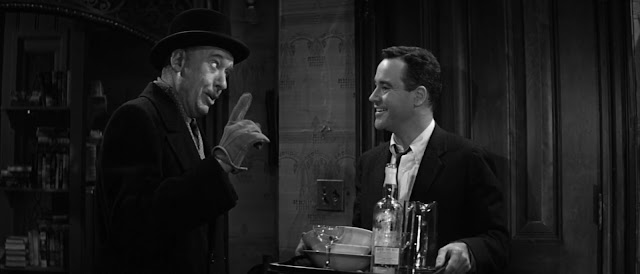 |
| Baxter puts up with the demands of Kirkeby, one of the managers using his apartment. |
REMAKES AND RETELLINGS:
It's unsurprising that The Apartment was reworked as a stage production. It is surprising that it was turned into a musical. Burt Bacharach, Hal David, and Neil Simon collaborated on the 1968 production, Promises, Promises, which toured from 1968 - 1972. This show was revived in 2010, with two new songs by Bacharach and David.
OVERALL:
Both Jack Lemmon and Billy Wilder would later state that they considered The Apartment to be a drama and not a comedy, and I'd largely agree. Humor is used to draw viewers into the story and to keep them engaged during the early stage-setting. Then the comedy elements gradually decrease until, by the midpoint, the occasional funny line is mostly there to lighten and contrast with the rest of it.
The script is as sharp as you'd expect of a film from this era by Wilder and co-writer I. A. L. Diamond. In terms of film techniques, it's such a textbook case in mixing different genres that if it isn't taught in film schools, it should be.
Most importantly, it's still an engaging movie boasting excellent performances and a satisfying ending. Just as a film to watch, I'd rank it as highly recommended.
Rating: 8/10.
Best Motion Picture - 1959: Ben-Hur
Best Motion Picture - 1961: West Side Story
Review Index
To receive new review updates, follow me:
On BlueSky:
On Threads:


No comments:
Post a Comment